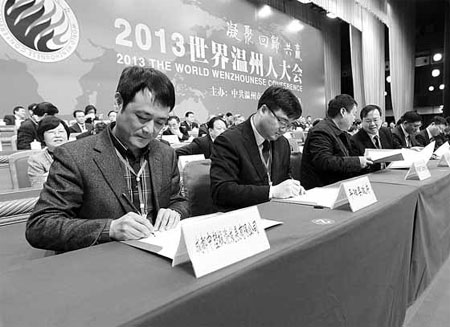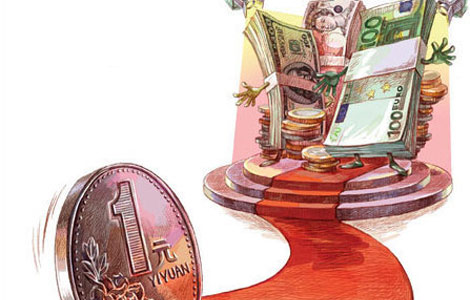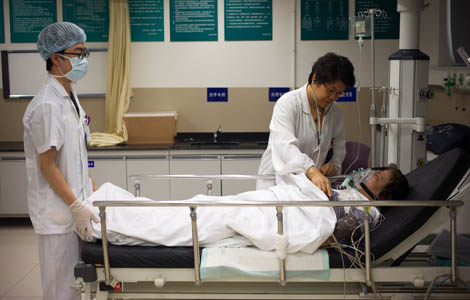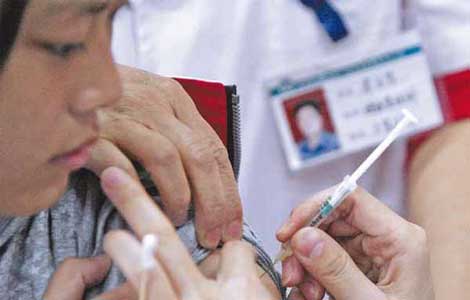Wenzhou returning entrepreneurs breathe new life into economy
Updated: 2013-07-24 07:20
By Yu Ran in Wenzhou, Zhejiang (China Daily)
|
||||||||
|
Wenzhou businessmen operating outside the city invested over 66.5 billion yuan in Wenzhou's development projects in 2012, with those overseas contributing over 2.43 billion yuan. Provided to China Daily |
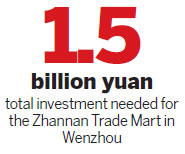
China's hub of private industry sees the return of an increasing number of merchants to their hometown from overseas, many from Europe, reports Yu Ran in Wenzhou, Zhejiang.
Some people who left Wenzhou years ago are now coming back with capital and new ideas.
As the global economy remains sluggish, the government of Wenzhou has been trying to build platforms for overseas businessmen, and more and more native Wenzhou entrepreneurs are now eyeing their hometown for business opportunities.
The coastal city has been well known for its entrepreneurs over the past three decades.
Sixteen years ago, the then 41-year-old Chen Zhiyuan left his hometown - Wenzhou - for Dubai with nearly 1 million yuan ($160,000) in debt after suffering huge losses at his trading company.
"I chose to get out of the country at the nadir of my career. I was trying to prove that Wenzhou businessmen are not afraid to face difficulties," said Chen, who flew back to Wenzhou in 2011 after he made a fortune in Dubai.
Chen, the former president of the Wenzhou chamber of commerce in Dubai, was the founder of three major China-oriented markets selling all sorts of Chinese products there, with an annual sales revenue of over $1 billion.
"As a Chinese businessman, I had the advantage of getting products from factories directly in a shorter period of time than my competitors and with lower prices. I saw the great potential of the popular Chinese products," said Chen, who was a wholesaler of cheap Chinese products for the first three years.
He opened the first Chinatown mall in 2000 in Dubai, with hundreds of shops and run by Chinese merchants, mostly from Wenzhou. In the next decade, he launched two other small malls to unite Wenzhou businessmen because he believed that solidarity has always been a tradition of Wenzhou merchants.
After the recent financial crisis hit Europe and the United States, Chen realized that it could be the right time to return to his hometown with the money and experience and ready for new challenges.
"I've seen great changes in Wenzhou, which achieved booming economic development before 2010, which then slowed with the credit crisis in 2011, and I wanted to make a contribution to save the city," said Chen.
The second phase of the Zhannan Trade Mart was one of the projects where Chen invested in February. The total investment is valued at about 1.5 billion yuan ($242.84 million), and the project covers an area of 4.33 hectares with a construction area of 151,774 square meters.
"I want to bring the concept of high-end marketing to Wenzhou by introducing a variety of design items to the city from all over the world and building a global trading platform here," said Chen.
The project was launched in June and the first phase is expected to be finished by October. It already attracted 80 percent of the investment needed for its completion.
"I would like to put money into similar projects planned by the city government to reboot Wenzhou's economy as soon as possible," said Chen.
Chen added that he had returned for better opportunities, especially in the commercial property and financial sectors, which will be the major focus in the near future.
To attract businessmen back to the city, Wenzhou launched 243 projects in 2012 with a total investment valued at more than 82.5 billion yuan. Wenzhou businessmen away from the city invested over 66.5 billion yuan in 207 of those projects, with overseas merchants contributing over 2.43 billion yuan.
"We've noticed that the investment environment in Wenzhou is not good enough compared with other cities but I'm fully confident that the city will be a hotbed for investors in the near future with the support from returned Wenzhou businessmen," said Chen Derong, former secretary of the Wenzhou municipal committee of the Communist Party of China at the opening ceremony of the third World Wenzhou People Conference in February.
Favorable environment
Chen Derong added that the government will continue to play its role and create favorable business conditions so that businessmen can help stimulate local economic development while reaping the rewards.
Meanwhile, some overseas businessmen decided to come back to open factories and transfer production lines to the city.
Xia Guangyao, the chairman of Wenzhou Jialunte Textile Finery Co Ltd, said he firmly believes that running a business at home is a better way to earn higher profits.
Xia returned to his hometown more than 10 years ago.
"I used to buy scarves from Chinese plants and sell them to European countries when I started my small business in France in 1992 after I noticed that the colorful and cheap accessories were very popular among all the age groups in Europe," said Xia.
Between 1992 and 1996, Xia managed to sell over 20 million scarves and made his first 10 million yuan.
After transforming his business from a scarf firm to a clothes-trading company in 1996, Xia realized that the prices of the products would be more controllable if he could manufacture them.
In 1999, he returned to his hometown and set up his first production base in Wenzhou, employing migrant workers.
"I chose to come back at the peak time of my business in Europe in order to expand my company to a global brand, instead of a small local trader in European countries because it was much cheaper to make and sell products in a chain," said Xia.
Just as Xia expected, having the clothes made in Wenzhou enabled him to obtain an output value of 80 million yuan in 2011, nearly 60 million yuan of which were contributed by export clients. He also registered his brand, the R&G fashion group, in Los Angeles in 2007 to target the US market.
Although his trading business was affected by the global crisis, with a 30 percent drop on the number of overseas orders, he still consistently focused on clothing production and eyed emerging markets such as Brazil, African countries as well as high-end markets in Europe and the US.
"I know I have made the right decision to come back at a good timse and I am quite confident that my made-in-China clothes will be sold in shopping malls all over the world sooner or later," said Xia.
A recent plan to attract investment issued by the city government at the end of 2012 aimed to receive a total amount of $1.5 billion in 2016 with an average annual increase rate of 50 percent.
"I've seen many overseas companies owned by Wenzhou merchants opening their factories and creating brands in Wenzhou in the past decade as they realized that China could be a potential production base for all kinds of products," said Zhou Dewen, chairman of the Wenzhou SME Development Association.
Zhou added that the return of experienced overseas businessmen had brought back innovative concepts and technologies, spurring local companies to restructure and upgrade to achieve higher efficiency and make better products.
Wenzhou was selected for a pilot financial reform project in March 2012 after the outbreak of a financial crisis arising from widespread loan defaults by many hard-pressed local factory owners and investors.
The crisis prompted the government to act with an overall plan to channel private sector funds, which were largely deposited in underground banks for higher returns, to properly regulated and supervised lending mechanisms.
Meanwhile, returned businessmen such as Li Jianjiang, the owner of Zhejiang Teling Light Industry Co Ltd, tried to help local companies by launching a small-loan company.
After registering a lighting company in Japan in 1993 and opening Zhejiang Teling Light Industry Co Ltd in Wenzhou as a production base in 1997, Li spent most of his time in Japan and flew back to Wenzhou once per quarter for the past two decades.
After getting involved in the financial industry in 2010, Li moved his focus back to Wenzhou and left his lighting business in Japan with his family members.
"I think the small-loan company will bring more profits as the manufacturing industry is slowing down, affected by the global recession that started in 2011," said Li.
Li added that the ongoing financial reform in Wenzhou could be a perfect opportunity to apply new concepts, approved by the central government, to offer financial support to struggling local companies.
The small-loan company was able to offer loans of over 1 billion yuan to hundreds of companies in 2012.
"I'm discussing with my business partners the launch of a private bank to break the monopoly of State-owned banks and supply loans to privately owned companies with controllable risks," said Li.
Contact the writer at yuran@chinadaily.com.cn.
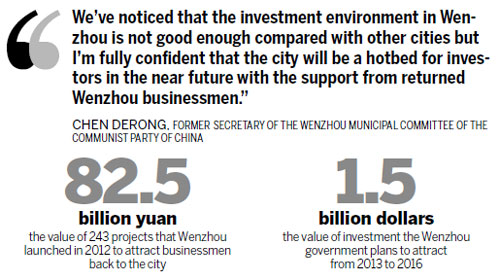
(China Daily USA 07/24/2013 page13)
Most Viewed
Editor's Picks

|

|

|

|

|

|
Today's Top News
US diplomat says China ties a priority
Nation falling short on IT security
Weiner not dropping out of NYC mayoral race
Death toll from H1N1 in Argentina reaches 38
DPRK halt on rocket facility confirmed
Celebrations erupt after word of regal delivery
Office to close due to protest in Manila
Multinationals' dependence on China grows
US Weekly

|

|
